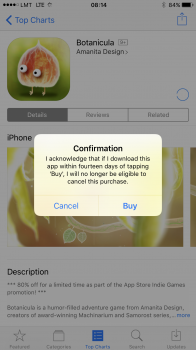Recently I entered into a discussion with Apple support and an app developer raising concerns about "false advertising" issues within an app I have bought. For the first time using the App Store for around 8 years now I asked (accepted) to cancel and refund a series of in-app purchases (around 10 purchases made within a month).
Apple support acted very professionally and in a timely manner, and issued refunds. However, shortly after the issue I started to receive notifications upon any purchase in the App Store requiring me to accept the following acknowledgment: "If you download or use this iOS App within fourteen days of buying it, you will no longer be eligible to cancel this purchase." Additionally, an email containing acknowledgment that I have accepted such term is sent to me after a purchase is made, originating from: no_reply@email.apple.com.
After googling and finding that this is some kind of a practice Apple does to prevent users to refund apps without a reason, and knowing that Apple proposed and confirmed to refund my in-app purchases, made within the app in question, for a good reason, I contacted support team again, asking to explain why this is happening (and asking about the popups and e-mails).
As a result I received an e-mail from the support team stating: "After reviewing your case, I would like to inform you that neither the email nor its sender are associated with Apple. The email is a phishing attempt, designed to trick users into visiting a website."
I explained for a second time that upon a purchase I receive a popup in the App Store as well (I attached it to this post). A second response was sent back from the support team stating: "As mentioned in my previous email, I would like to inform that it's a the email is a phishing attempt, designed to trick users into visiting a website. You can even forward it to reportphishing@apple.com so we can investigate it. When you forward it, make sure you provide complete headers from the original email."
This is getting quite ridiculous. This story is going on already for some two months, and instead of solving anything, it gets even more complicated. Any advices to solve this would be welcome.
Apple support acted very professionally and in a timely manner, and issued refunds. However, shortly after the issue I started to receive notifications upon any purchase in the App Store requiring me to accept the following acknowledgment: "If you download or use this iOS App within fourteen days of buying it, you will no longer be eligible to cancel this purchase." Additionally, an email containing acknowledgment that I have accepted such term is sent to me after a purchase is made, originating from: no_reply@email.apple.com.
After googling and finding that this is some kind of a practice Apple does to prevent users to refund apps without a reason, and knowing that Apple proposed and confirmed to refund my in-app purchases, made within the app in question, for a good reason, I contacted support team again, asking to explain why this is happening (and asking about the popups and e-mails).
As a result I received an e-mail from the support team stating: "After reviewing your case, I would like to inform you that neither the email nor its sender are associated with Apple. The email is a phishing attempt, designed to trick users into visiting a website."
I explained for a second time that upon a purchase I receive a popup in the App Store as well (I attached it to this post). A second response was sent back from the support team stating: "As mentioned in my previous email, I would like to inform that it's a the email is a phishing attempt, designed to trick users into visiting a website. You can even forward it to reportphishing@apple.com so we can investigate it. When you forward it, make sure you provide complete headers from the original email."
This is getting quite ridiculous. This story is going on already for some two months, and instead of solving anything, it gets even more complicated. Any advices to solve this would be welcome.


